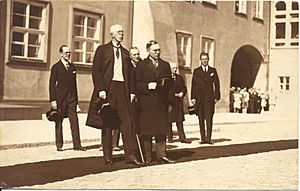August Rei facts for kids
Quick facts for kids
August Rei
|
|
|---|---|

Rootsi kuningas Gustav V Tallinnas 1929.a., AM F 27186
|
|
| Prime Minister in duties of the President | |
| In office 9 January 1945 – 29 March 1963 |
|
| Preceded by | Jüri Uluots |
| Succeeded by | Aleksander Warma |
| 9th State Elder of Estonia |
|
| In office 4 December 1928 – 9 July 1929 |
|
| Preceded by | Jaan Tõnisson |
| Succeeded by | Otto Strandman |
| Personal details | |
| Born | 22 March 1886 Kurla, Pilistvere Parish, Kreis Fellin, Governorate of Livonia, Russian Empire |
| Died | 29 March 1963 (aged 77) Stockholm, Sweden |
| Political party | Social Democratic Workers' Party Socialist Workers' Party |
| Alma mater | Saint Petersburg State University |
August Rei (born March 22, 1886 – died March 29, 1963) was an important Estonian politician. He was a leader in the Social Democratic movement. He played a big role in Estonia's history, especially during difficult times.
Contents
August Rei's Early Life and Education
August Rei was born in a place called Kurla. This was in the Russian Empire at the time. Today, it is part of Türi Parish in Järva County, Estonia.
He went to high school in Tartu and later in Velikiy Novgorod. From 1904 to 1911, he studied law at St. Petersburg University.
Beginnings of Political Influence
August Rei was involved in the Russian revolution of 1905. This was a time of big changes and protests in Russia. In 1906, he helped edit a secret newspaper called Sotsiaaldemokraat in Tallinn.
He served in the army from 1912 to 1913. Then, he worked as a lawyer in Viljandi. During World War I, from 1914 to 1917, he was an artillery officer.
Role in Estonian Military Units
After the February Revolution in 1917, Estonian politicians worked to create Estonian army units. August Rei was part of this effort. He was the Assistant Chairman of the Supreme Committee of the Estonian military.
He also worked as an editor for the Sotsiaaldemokraat newspaper again. Later, he edited Rahva Sõna (Word of the People). August Rei was a key leader in Estonia's social democratic movement. He also continued his work as a lawyer. He received an honorary law degree from Tartu University.
August Rei's Political Career
August Rei held many important positions in the Estonian government.
- Member of the Estonian Provincial Assembly (Maapäev): From 1917 to 1919, he was part of the assembly that led Estonia towards independence.
- Minister and Deputy Prime Minister: In 1918–1919, he served as Minister of Labour and Social Welfare. He was also the Deputy Prime Minister and Acting Minister of Education.
- Chairman of the Constituent Assembly: From 1919 to 1920, he led the assembly that wrote Estonia's first constitution.
- Head of Border Committee: From 1923 to 1925, he led the Estonian team working on the border with Latvia.
- Speaker of the Riigikogu: From 1925 to 1926, he was the Speaker of the Estonian Parliament, called the Riigikogu.
- State Elder (Head of State): From December 4, 1928, to July 9, 1929, August Rei was the State Elder of Estonia. This was like being the President of the country.
- Minister of Foreign Affairs: He served as the Minister of Foreign Affairs from 1932 to 1933. He also held this role as Deputy Minister from 1936 to 1937.
- Envoy to the Soviet Union: From 1938 to 1940, he was Estonia's official representative to the Soviet Union.
Prime Minister in Exile
When Estonia was occupied during World War II, August Rei continued to serve his country. He became the Minister of Foreign Affairs in exile in 1944.
From January 9, 1945, until his death on March 29, 1963, he was the Prime Minister in capacity of the President of the Republic in exile. This meant he led the Estonian government that continued to work for Estonia's freedom from outside the country.
Literary Interests
August Rei also enjoyed writing. He wrote and translated books about socialist ideas. He also published his own memoirs, which are like personal stories of his life.
Awards
- 1920 – Cross of Liberty III/I
- 1930 – Order of the Cross of the Eagle I
Images for kids
 | John T. Biggers |
 | Thomas Blackshear |
 | Mark Bradford |
 | Beverly Buchanan |


